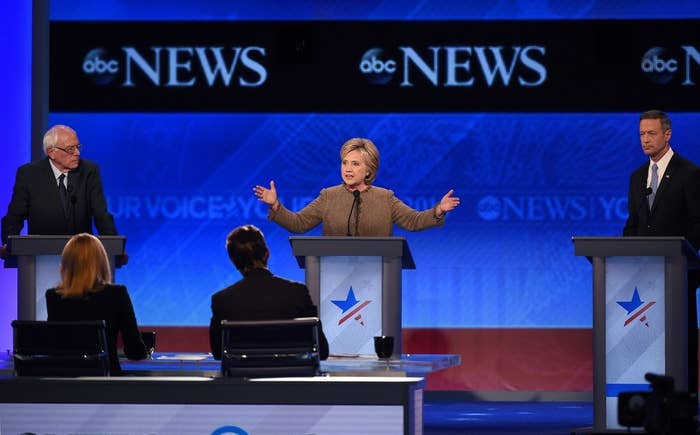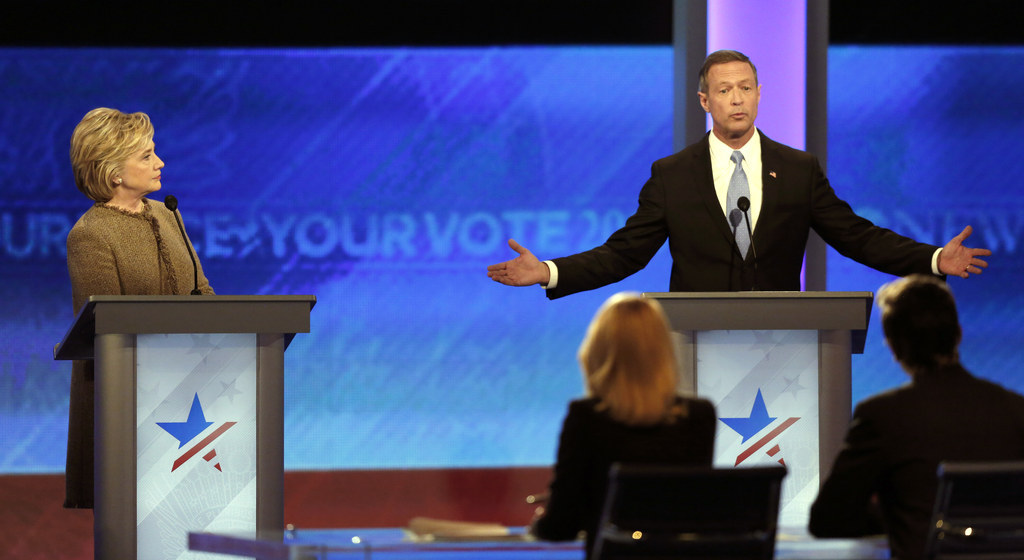Here's what's happened:
* Former Secretary of State Hillary Clinton, Vermont Sen. Bernie Sanders and former Maryland Gov. Martin O'Malley faced off at Saint Anselm College in Manchester, New Hampshire. David Muir and Martha Raddatz moderated.
* There were some sharp disagreements and some odd moments — like when the action resumed after a commercial break before Clinton was back on stage — but ultimately the debate didn't seem to change the power dynamics of the campaign. Clinton put on a solid performance.
* Clinton promised that she would not raise taxes on families making less than $250,000 annually.
* O'Malley attacked Clinton and Sanders on their records regarding gun control — and both fought back vehemently.
* And Clinton and Sanders sparred over regime change — specifically, how to handle Syria's President Bashar al-Assad.
* Clinton and O'Malley also repeatedly called out GOP front-runner Donald Trump for his comments about banning Muslims from entering the U.S.

Right off the bat, Sanders apologized for his campaign's accessing proprietary Clinton voter data.
A quick primer on this issue:
* The candidates faced off after it was revealed Thursday that Sanders' campaign accessed Hillary Clinton's internal voter data due what was said to be a Democratic National Committee software glitch.
* In response, the DNC suspended the Sanders' campaign's access to the party's 50-state voter file six weeks from the first caucuses and primaries.
* The Sanders campaign shot back Friday, filing a federal lawsuit against the DNC and saying the organization was trying to hold its campaign hostage.
* The Clinton campaign responded saying the Sanders campaign actions "may have been a violation of the law."
* Finally, the DNC restored the the Sanders' campaign's access to the database.
At the debate, at the end of a lengthy explanation over what happened — and after expressing disappointment that Clinton's campaign went to the media about this issue — Sanders was asked if he should apologize to Clinton on stage.
"Yes, I apologize," Sanders said.
"Not only to I apologize to Secretary Clinton…I apologize to my supporters."
Clinton accepted the apology, and said, "we should move on, I don't think the American people are all that interested in all this."
When asked about firearms, the three candidates agreed on the need for gun control and legislation. It also led to a sharp exchange where Clinton and Sanders accused O'Malley of being dishonest about their records on the issue.
Clinton spoke about the need to establish a coalition in the United States to fight for gun regulations.
"Guns alone will not make American's safer. Arming people to do what, I think is not the appropriate response to terrorism," Clinton said about calls to arm Americans after the recent attacks in San Bernardino, California.
Sanders spoke about strengthening background checks that would limit access of guns to the mentally ill and criminals.
"I think we have to bring in the vast majority of people that do believe in sensible gun regulation," he said.
But the topic became a point of contention when O'Malley called out the record of his colleagues, accusing Sanders of voting against the Brady Bill, which would have mandated federal background checks and a five-day waiting.
O'Malley also accused Clinton of flip-flopping on the issue, stating that "Clinton changes her position on this very election year."
O'Malley, the former governor of Maryland, said he would not confiscate the 7 to 10 million semi-automatic rifles that are believed to be owned by Americans today, but he dd say that he would work for regulations against the weapons and fight the National Rifle Association.
Clinton and Sanders defended their records in gun control. The former Secretary of State said she supported the Brady Bill, and urged her colleagues to campaign on legislation to hold gun manufacturers responsible for crimes committed with their products.
Sanders also fought back on the issue.
"Do not tell me that I have not shown courage in standing up to the gun lobby to voting on banning assault weapons," Sanders said to the former governor of Maryland.
Here's a clip of Sanders getting fired up about his gun control record.
WATCH: @BernieSanders: "Do not tell me...that I have not shown courage in standing up to the gun people." https://t.co/K9hG5cHr0y
Clinton went after Republican front-runner Donald Trump for his plan to ban Muslims from entering the U.S., saying that his rhetoric “fans the flames of radicalization” and is used as a recruitment tool by ISIS.
"He is becoming ISIS' best recruiter," Clinton said of Trump. She added that ISIS is going to start showing people videos of Trump to recruit more jihadists.
Clinton said Trump's rhetoric supports the "clash of civilizations" argument that helps ISIS's message the the West is waging a war on Islam.
Clinton added Trump "has a great capacity to use bluster and bigotry" to inflame people, and said Trump's comments alienate the very people the U.S. needs to help prevent attacks at home and fight ISIS abroad.
Clinton was also asked if she agrees with American governors who have said they won't take in Syrian refugees after the Paris terror attacks.
"I don't think a halt is necessary," Clinton said. "We have to have an increased vetting and screening ... I know it's not going to happen overnight"
"We don't want to sacrifice our values ... don't want to turn into a nation of fear instead of a nation of resolve."
"I would prioritize widows and orphans and the elderly," she said.
Let's take a break for some of the best quotes and one-liners of the night. The links are video clips:
* "Guns in and of themselves in my opinion will not make Americans safer." —Clinton
* "Now this is getting to be fun." —Sanders, as the tax portion of the debate heated up.
* "The insurance companies, the drug companies, are bribing the United States Congress." —Sanders on healthcare reform
* "They don't want to raise the minimum wage, they don't want to do anything to raise incomes." —Clinton on the GOP.
* O'Malley said, confusingly, he was "the very first post-9/11 mayor and the very first post-9/11 governor."
* "He is becoming ISIS' best recruiter." —Clinton on Trump
* "Yes, I apologize." —Sanders to Clinton on his campaign accessing her campaign's voter data.
* "Where is it written it is the job of the US...to determine when dictators have to go?" —O'Malley
* "Booooooo." —The audience, after O'Malley asked "May I offer a different generation's perspective on this?" during a discussion on Syria.
* "Sorry." —Clinton, after arriving late to the stage after an apparent bathroom break.
* "Trump has a great capacity to use bluster and bigotry to inflame people." —Clinton
* "Police officers should not be shooting unarmed people, predominately African Americans." —Sanders
* "Thank you, goodnight, and may the force be with you." —Clinton
On taxes, Clinton promised that she would not raise taxes on families making less than $250,000 annually.
Clinton also argued that Sanders' proposals, particularly for free college and single payer health care, would cost trillions of dollars in the federal budget.
"I think we've got to be really thoughtful about how we're going to afford what we propose," Clinton said.
Sanders shot back, saying the American middle class would pay less for health care under his plan that under Clinton's plan. Clinton responded, saying, "My analysis is that you are going to have to get more taxes out of middle class families. I'm the only person on this stage saying 'no middle class tax raises.' That is off the table as far as I'm concerned."

On race and policing, all three candidates appeared to agree on major points — reforming police departments and increasing transparency.
"I feel very strongly we have to reform our criminal justice system," Clinton said, adding that in several communities of color, trust has been lost.
She called to continue the work of the police commission President Obama has already begun, which has invited police chiefs from several departments across the country to come up with solutions to address community concerns.
"We have to hear the voices of those men and women, boys and girls, who feel like strangers in their own country," she said.
O'Malley agreed, and called for reducing incarceration rates and increasing drug treatment facilities.
"As a nation, we have to embrace this moment and make our (police) departments more open," he said.
Sanders also called for reducing incarceration rates, and repeated his call to remove marijuana from the controlled substance act, which he said has helped flood U.S. prisons.
"Today in America we have more people in jail than any other country on earth," Sanders said.
He also said there needs to be an effort to end institutional racism, address wage disparities, and address the issue of police officers using excessive force.
"Police officers should not be shooting unarmed people, predominantly African Americans," he said. "We need to make police departments look like the communities they serve."
The conflict in Syria and its president, Bashar al-Assad, also brought a divide between the candidates, with O’Malley and Sanders disagreeing with Clinton’s call for regime change in the troubled region.
The former Secretary of State said she would work to establish a no-fly zone over Syria, which she argued could help stem the flow of refugees that have been fleeing the country and making their way to Europe.
Clinton argued it would also help the U.S. gain leverage against Russia, to point their attention away from rebels that are fighting Assad, and instead focusing their military on ISIS fighters in the region.
But Sanders was the first to disagree with the tactic, saying Clinton is "a little too aggressive without knowing what the unintended consequences might be."
The Senator from Vermont argued the U.S. has pushed to hard, and too often for regime change in Iraq, Libya and Syria.
"Getting rid of dictators is easy," Sanders said. "But before you do that, you have to think about what would happen the day after."
Sanders and O'Malley both argued the focus in Syria should be fighting ISIS, not pushing Assad out of power because of the possible power vacuum in the country.
"We need to restrain ourselves," O'Malley said, describing regime change policies as Cold War tactics. "I think we need to focus on destroying ISIL."
But Clinton defended her position, arguing rebels on the ground in Syria would not support American efforts to fight ISIS unless they knew they had support to remove Assad from power.
"We're doing both at the same time," she said, because rebels fighting ISIS are also looking for "political support abroad for a transitional government."



